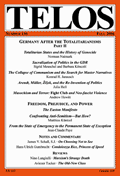As an occasional feature on TELOSscope, we highlight a past Telos article whose critical insights continue to illuminate our thinking and challenge our assumptions. Today, Nassim Benchaabane looks at James V. Schall’s “On Choosing Not to See” from Telos 136 (Fall 2006).
 Two tourists happen upon a waterfall on the order of Niagara. One describes it as “sublime,” the other as “pretty,” but “pretty” is the wrong description. This scenario, from a passage in C.S. Lewis’s The Abolition of Man, is not merely about the proper use of words. It poses a more serious question, a question of objective reality, and it weighs heavily not only on philosophical studies such as epistemology, metaphysics, and ontology, but also on life in general. This is the powerful question at the heart of James V. Shall’s “On Choosing Not to See,” a profound and expertly written article that carries a controversial declaration: modern society, often a constructed alternate to the truth of what is, is gripped by our power to choose “not to see.”
Two tourists happen upon a waterfall on the order of Niagara. One describes it as “sublime,” the other as “pretty,” but “pretty” is the wrong description. This scenario, from a passage in C.S. Lewis’s The Abolition of Man, is not merely about the proper use of words. It poses a more serious question, a question of objective reality, and it weighs heavily not only on philosophical studies such as epistemology, metaphysics, and ontology, but also on life in general. This is the powerful question at the heart of James V. Shall’s “On Choosing Not to See,” a profound and expertly written article that carries a controversial declaration: modern society, often a constructed alternate to the truth of what is, is gripped by our power to choose “not to see.”







